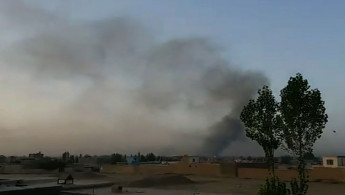Afghan special forces sent to fight off Taliban in Ghazni
Afghan special forces moved into the embattled Ghazni overnight in a bid to defeat Taliban insurgents as the fight for the eastern city enters its fourth day, despite Kabul's claims it was firmly under government control.
Ghazni is considered a strategic position on the main road linking the capital Kabul with southern Afghanistan, and the attack has dealt a severe blow to President Ashraf Ghani and his hopes of initiating peace talks with the Taliban.
Reinforcements were sent in from Kabul as Taliban fighters roamed the city and set fire to government offices, controlling several police checkpoints.
"The situation is chaotic," Amanullah Kamrani, deputy head of the Ghazni provincial council, told AFP from Kabul.
"In Ghazni, only the police headquarters, governor's office and a few departments are under Afghan forces' control - the rest are under the Taliban fighters' control," he added.
The descriptions from the residents stand in stark contrast to statements released by US and Afghan officials who reassured the public that government forces were firmly in control of the city, vowing that Ghazni was in no danger of being seized by the Taliban.
Twitter Post
|
Nearly 100 soldiers and police officers have been killed, with many wounded according to reports from security officials, who also added that casualties on the Taliban side are similarly heavy.
The number of civilian deaths are not known, however, eyewitness report seeing many bodies on the streets. Tolo News, the country's largest television station broadcast shaky phone footage showing multiple fires raging.
Ghazni - around two hours by road from the capital Kabul - has been under increasing danger from massing Taliban fighters for months, with reports suggesting insurgents had infiltrated the city at will.
The onslaught was the latest attempt by the Taliban to overrun an urban centre and comes as pressure increases on the insurgents to begin peace talks with the government to end the nearly 17-year-old war.
The attack was the Taliban's largest operation since an unprecedented truce in June over the Eid holiday brought fighting to a brief halt.
A Taliban delegation landed in Uzbekistan - which is mediating talks with the government - earlier this month to discuss peace talks.
The UN released a report last month showing a record number of civilians killed in the first six months of 2018, with militant attacks and suicide bombs the leading causes of death.
The toll of 1,692 fatalities was one percent more than a year earlier and the highest for the period since the United Nations Assistance Mission in Afghanistan (UNAMA) began keeping records in 2009.
The record death toll came despite an unprecedented ceasefire by Afghan security forces and the Taliban during Ramadan that was largely respected by both sides, UNAMA said.
Follow us on Twitter: @The_NewArab





 Follow the Middle East's top stories in English at The New Arab on Google News
Follow the Middle East's top stories in English at The New Arab on Google News
![Israeli forces ordered bombed Gaza's Jabalia, ordering residents to leave [Getty]](/sites/default/files/styles/image_330x185/public/2176418030.jpeg?h=a5f2f23a&itok=_YGZaP1z)

